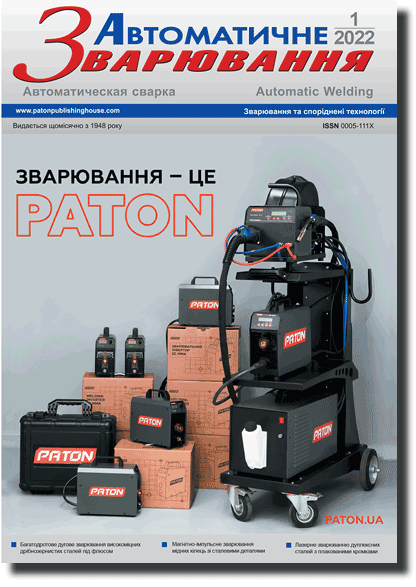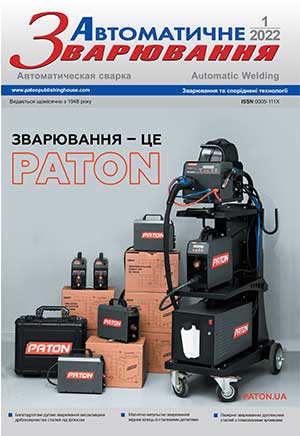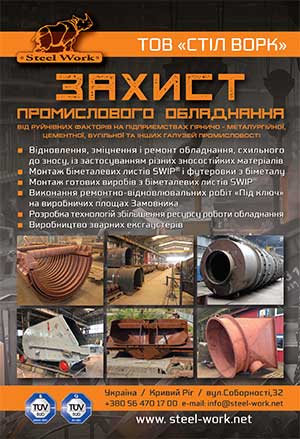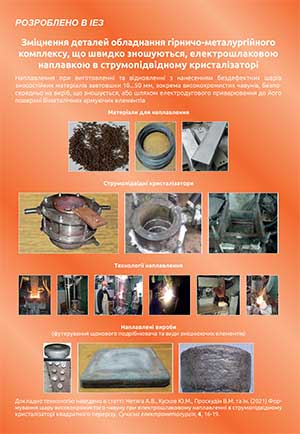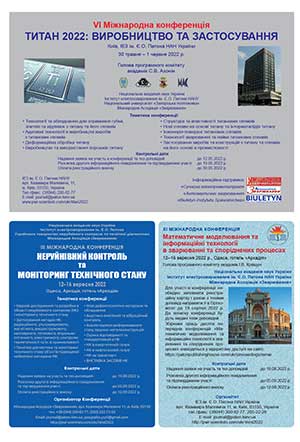| 2022 №01 (03) |
DOI of Article 10.37434/as2022.01.04 |
2022 №01 (05) |
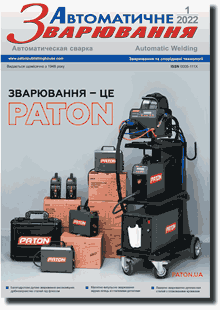
"Avtomatychne Zvaryuvannya" (Automatic Welding), #1, 2022, pp. 26-32
Influence of time of existence of molten pool in electron radiation processes on the level of evaporation of elements with a high vapor tension
N.V. Piskun, E.L. Vrzhizhevsky, V.A. Kostin, T.G. Taranova, I.L. Bogaichuk, І.І. Statkevich
E.O. Paton Electric Welding Institute of the NAS of Ukraine. 11 Kazymyr Malevych Str., 03150, Kyiv, Ukraine. E-mail: office@paton.kiev.ua
The intermetallic Ti – 44Al – 5Nb – 3Cr – 1.5Zr alloy (at.%), developed and smelted at the E.O. Paton Electric Welding Institute of the NAS of Ukraine, was studied. The processes of evaporation of elements with a high vapor tension, such as aluminum and chromium for two electron beam processes: melting and welding were studied. It was experimentally proven and confirmed by investigations that the use of directional crystallization by electron beam melting, which takes place in deep vacuum conditions, does not allow providing uniformity of structure along the length of the ingot, which is associated with evaporation of elements with a high vapor tension, such as aluminum and chromium. It was found that during electron beam welding of samples of intermetallic Ti – 44Al – 5Nb – 3Cr – 1.5Zr alloy (at.%), cracks appeared, but, as was proved by X-ray spectral studies, evaporation of elements does not occur. The parameters of these two processes were compared and it is shown that the level of evaporation of elements with a high vapor tension in electron beam processes is influenced by the time of existence of the material in a liquid state and the size of the molten zone. 17 Ref., 1 Tabl., 9 Fig.
Keywords: intermetallic alloy of TiAl system, electron beam melting, electron beam welding, evaporation, elements with a high vapor tension, molten zone, crystallization time
Received: 25.10.2021
References
1. Schwaighofer, E., Clemens, H., Mayer, S., et al. (2014) Microstructural design and mechanical properties of a cast and heattreated intermetallic multi-phase γ-TiAl based alloy. Intermetallics, 44, 128-140. https://doi.org/10.1016/j.intermet.2013.09.0102. Bewlay, B.P., Nag, S., Suzuki, A., Weimer, M.J. (2016) TiAl alloys in commercial aircraft engines. Materials at High Temperatures, 33, 549-559. https://doi.org/10.1080/09603409.2016.1183068
3. Clemens, H., Mayer, S. (2016) Intermetallic titanium aluminides in aerospace applications processing, microstructure and propertie. Mater. High Temp., 33, 560- 570. https://doi.org/10.1080/09603409.2016.1163792
4. Kablov, E.N., Lukin, V.I. (2008) Intermetallic based on titanium and nikil for advanced engineering product. The Paton Welding J., 11, 65-71.
5. (2013) Welding of titanium aluminide alloys (Review). Ibid, 8, 25-30.
6. Varich, I.Yu., Akhonin, S.V., Trigub, N.P. et al. (1997) Evaporation of aluminium from titanium-based alloys during cold-hearth electron beam melting. Problemy Spets. Elektrometallurgii, 4, 15-21[in Russian].
7. Paton, B.E., Trigub, N.P., Akhonin, S.V. et al. (2006) Electron beam melting of titanium. Kiev, Naukova Dumka [in Russian].
8. Zhuk, G.V., Trigub, N.P., Zamkov, V.N. (2003) Producing of titanium gamma-aluminide ingots using EB`HM method. Special Electrometallurgy, 4, 19-21.
9. Imaev, V.M., Imaev, R.M., Khismatullin, T.G. (2008) Mechanical properties of intermetallic alloy Ti-43Al- 7(Nb,Mo)-0.2B (at. %) after heat treatment. Fizika Metallov i Metallovedenie, 105(5), 516-522. https://doi.org/10.1134/S0031918X08050098
10. Kartavykh, A.V., Asnis, E.A., Piskun, N.V. et al. (2015) Microstructure and mechanical properties control of c-TiAl(Nb,Cr,Zr) intermetallic alloy by induction float zone processing. Journal of Alloy and Compounds, 643, 182-166. https://doi.org/10.1016/j.jallcom.2014.12.210
11. Kartavykh, A.V., Asnis, E.A., Piskun, N.V. et al. (2017) Room-temperature tensile properties of float-zone processed β-stabilized γ-TiAl(Nb,Cr,Zr) intermetallic. Journal Materials Letters, 188, 88-91. https://doi.org/10.1016/j.matlet.2016.10.103
12. Young-Won, Kim, Wilfried, Smarsly, Junpin, Lin et al. (2014) Electron beam joining of γ-titanium aluminide. Gamma Titanium Aluminide Alloys 2014. The Minerals, Metals & Materials Society, 99-103.
13. Vrzhyzhevskyi, E.L., Piskun, N.V., Taranova, T.G. et al. (2019) Prevention of gold cracks formation during electronbeam welding of alloy based on TiAl system intermetallic compound. Tekhnologicheskie Sistemy, 1(86), 43-49. DOI: https://doi.org/10.29010/86.6'); ?>
14. Bin, Tang, Xian, Sheng Qi, Hong, Chao Kou et al. (2016) Recrystallization Behavior at Diffusion Bonding Interface of High Nb Containing TiAl Alloy. Advanced Engineering Materials, 18, 4, 657-664. https://doi.org/10.1002/adem.201500457
15. Yang, K.L., Huang, J.C., Wang, Y.N. (2013) Phase transformation in the β-phase of super а2 Ti3Al base alloys during static annealing and super plastic deformation at 700…1000 °C. Acta Mater., 51, 2577-2594. https://doi.org/10.1016/S1359-6454(03)00057-0
16. Paton, B.E. (1987) Electron beam welding. Kiev, Naukova Dumka [in Russian].
17. Petrov, G.L., Tumarev, A.S. (1977) Theory of welding processes: Manual for higher educ. inst., 2nd Ed. Moscow, Vysshaya Shkola [in Russian].
Advertising in this issue:
The cost of subscription/purchase order journals or individual articles
| Journal/Currency | Annual Set | 1 issue printed |
1 issue |
one article |
| TPWJ/USD | 384 $ | 32 $ | 26 $ | 13 $ |
| TPWJ/EUR | 348 € | 29 € | 24 € | 12 € |
| TPWJ/UAH | 7200 UAH | 600 UAH | 600 UAH | 280 UAH |
| AS/UAH | 1800 UAH | 300 UAH | 300 UAH | 150 UAH |
| AS/USD | 192 $ | 32 $ | 26 $ | 13 $ |
| AS/EUR | 180 € | 30 € | 25 € | 12 € |
| SEM/UAH | 1200 UAH | 300 UAH | 300 UAH | 150 UAH |
| SEM/USD | 128 $ | 32 $ | 26 $ | 13 $ |
| SEM/EUR | 120 € | 30 € | 25 € | 12 € |
| TDNK/UAH | 1200 UAH | 300 UAH | 300 UAH | 150 UAH |
| TDNK/USD | 128 $ | 32 $ | 26 $ | 13 $ |
| TDNK/EUR | 120 € | 30 € | 25 € | 15 € |
AS = «Automatic Welding» - 6 issues per year;
TPWJ = «PATON WELDING JOURNAL» - 12 issues per year;
SEM = «Electrometallurgy Today» - 4 issues per year;
TDNK = «Technical Diagnostics and Non-Destructive Testing» - 4 issues per year.




